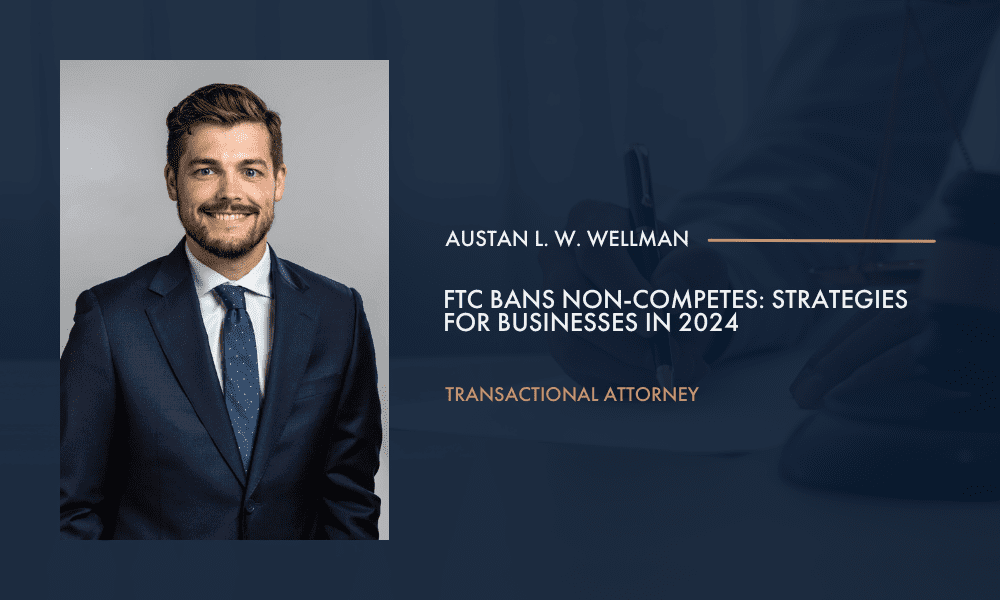Federal Trade Commission Bans Non-Competes: Introduction
This week, we’re breaking down the Federal Trade Commission’s (FTC) landmark decision to ban non-compete clauses—a big win for worker mobility but a concern for many businesses. Why the change? It’s all about fostering competition and innovation by letting employees move freely among companies. As we look into the FTC’s recent ruling to ban non-compete clauses, it’s important for business owners to recognize this shift not merely as a challenge but as an opportunity. By prioritizing talent retention, cultivating a supportive work environment, and strategically securing proprietary information through legal alternatives, businesses can not only maintain their competitive advantage but also foster a culture where innovation can flourish.
In my view, and likely shared by other attorneys, the old regime of non-compete clauses often proved problematic. Discussions with clients about these clauses typically centered on whether an employer was being overly harsh or defensive. Similarly, concerns about employee loyalty and intentions could create tension. Ultimately, there was never a silver bullet to a client’s answer, and conversations generally ended with an attorney’s favorite phrase, “it depends”.
With that, let’s dive into the FTC’s decision a little more and some alternatives you, as a business owner, can consider:
Legal Perspective on the Ban
The FTC’s ruling is rooted in antitrust principles, aiming to enhance labor market competition and reduce barriers to job mobility. From a legal standpoint, the argument is that non-competes restrict economic freedom and innovation by binding employees to one employer, thereby limiting their ability to increase earnings or start new ventures. Legal challenges are expected as businesses may see the rule as too broad, overlooking legitimate protections against losing proprietary information and trained staff.
The Response from Businesses
The legal community expects a flurry of challenges from businesses that view non-competes as vital for safeguarding their investments in employee training and proprietary knowledge. These businesses might argue that the FTC’s blanket prohibition is overly broad and fails to account for legitimate business interests that can be protected in less restrictive ways. Although legal challenges are expected, it is still too early to know the legal strength of those pushbacks.
Tools Still Available for Businesses
In the wake of the FTC’s ban on non-compete agreements, businesses must adapt by leveraging other legal instruments to protect their interests:
- Non-Disclosure Agreements (NDAs): These agreements are crucial for safeguarding sensitive information. Businesses can customize NDAs to cover various types of confidential data, ensuring employees are legally bound to secrecy during and after their tenure.
- Non-Solicitation Agreements: These prevent former employees from poaching clients and colleagues. By restricting employees from contacting business partners or employees for a set period after leaving the company, businesses can maintain stability and protect their workforce.
- Trade Secret Laws: These laws provide a safety net against the unauthorized use or disclosure of trade secrets. By clearly defining what constitutes a trade secret and the legal repercussions of its breach, businesses can deter misappropriation and pursue legal remedies if violations occur.
- Intellectual Property Rights: Companies should ensure that inventions, creative works, and other intellectual properties developed by employees are legally attributed to the company. Rigorous IP clauses in employment contracts can prevent disputes over ownership. This can generally be achieved through contracts like Proprietary Information and Invention Assignment Agreements (PIIAA).
- Restrictive Covenants: While non-competes are restricted, other covenants, like non-disclosure and non-solicitation, can be structured to protect a business’s operational interests without overly restricting former employees’ career opportunities.
By focusing on these strategies, businesses can effectively manage risks and protect their assets in a legally compliant manner that respects the new regulatory landscape.
A Legal Shift or a New Standard?
This ruling may set a precedent for how employment laws adapt to modern work environments, emphasizing worker mobility and innovation over restrictive practices. Legal experts are closely watching how this will play out in courts and in legislative assemblies across the country.
Potential Litigation and State Variances
Expect significant litigation as states and companies adjust to the new landscape. Some states may enact their own rules that either strengthen or moderate the federal guidelines, leading to a patchwork of regulations that could complicate compliance for multi-state operations.
Takeaway for Business Owners
This ruling underscores the need for strategic adaptation. While non-competes are no longer a tool, the use of NDAs, non-solicitation agreements, and proactive talent retention strategies will be more crucial than ever. It’s a pivotal time for leaders to rethink how they protect intellectual property and human assets without stifling innovation and growth. While business owners might initially view the ban on non-competes as a setback, those who proactively focus on enhancing talent retention and cultivating a positive work environment, along with legally safeguarding their proprietary information through alternative means, will not only maintain a competitive edge but also create a thriving culture of innovation.
Stay Connected and Informed
Your feedback is important to us. Reach out with any questions by giving us a call or visit Fargo Patent Law.

